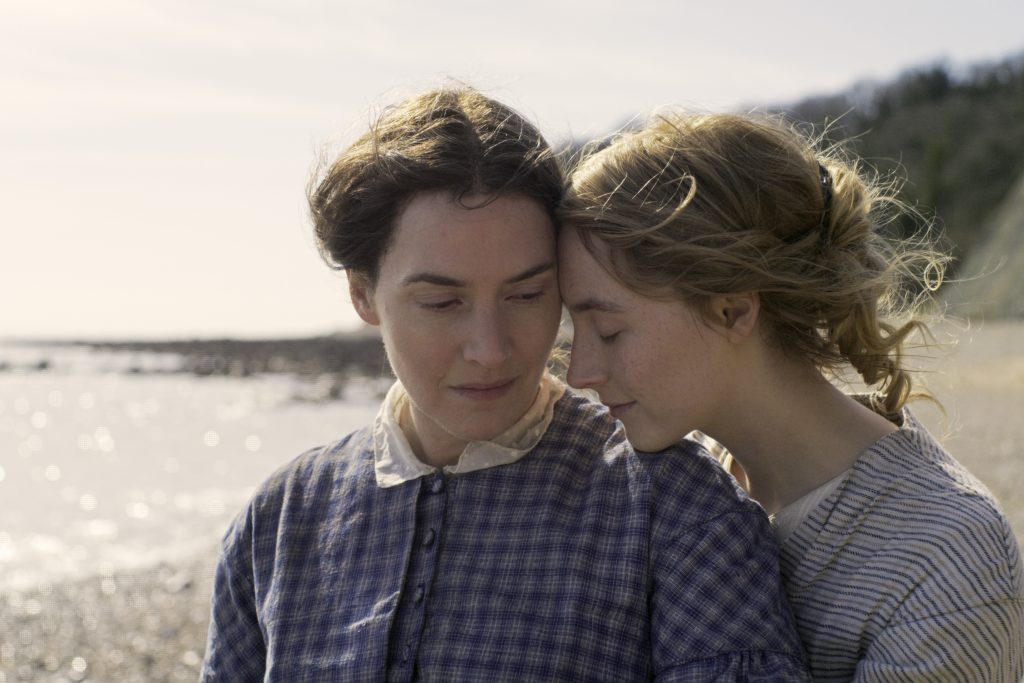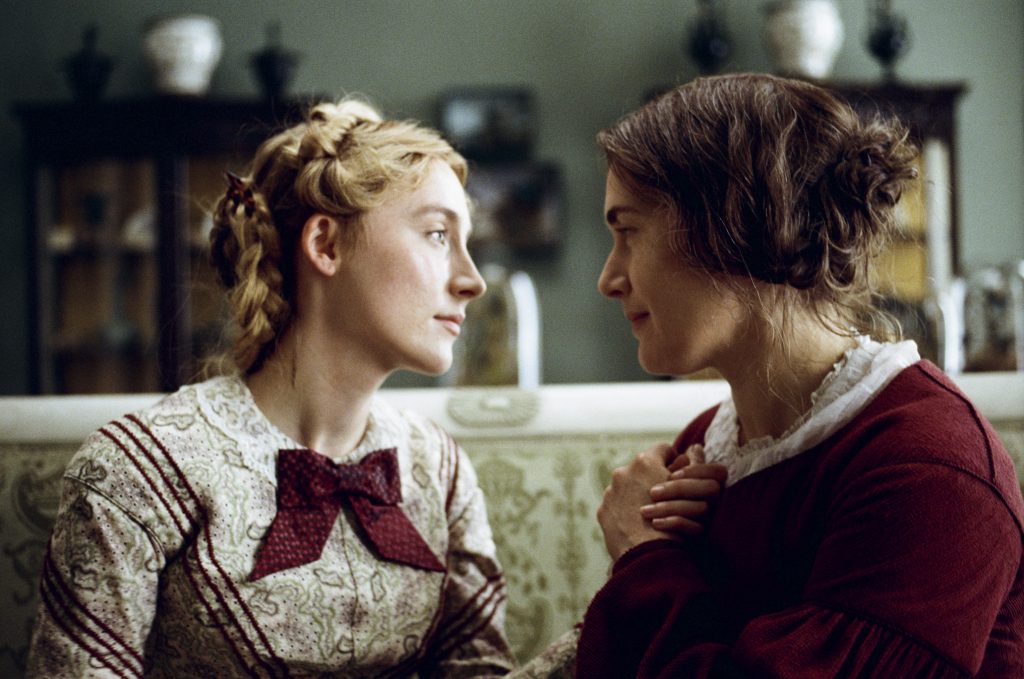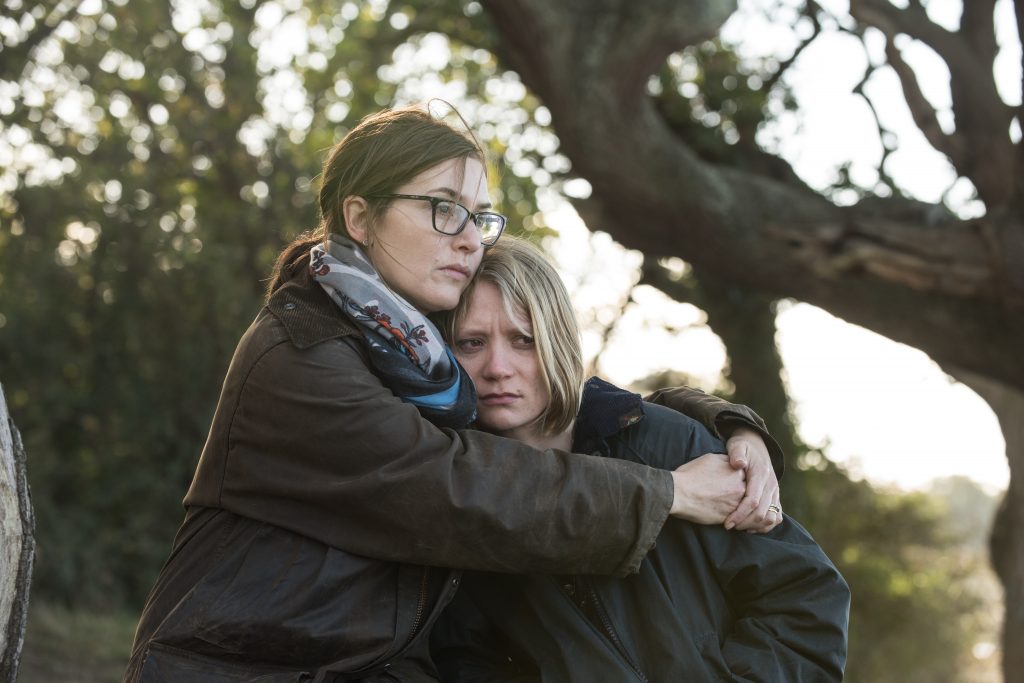November 15, 2020
by Carla Hay

Directed by Francis Lee
Culture Representation: Taking place in primarily in 1840s England, the drama “Ammonite” features an all-white cast of characters representing the working-class and the upper-middle-class.
Culture Clash: Two women—one who’s a working-class fossil hunter and one who’s a pampered socialite—have a secret love affair, even though one of them is married to a man.
Culture Audience: “Ammonite” will appeal primarily to people who like period dramas that place more emphasis on mood and atmosphere than on wordy dialogues and fast-paced action.

The British film “Ammonite” (written and directed by Francis Lee) is going to get inevitable comparisons to writer/director Céline Sciamma’s 2019 French film “Portrait of a Lady on Fire.” Released just one year apart, both are period European films that are about two women from different classes (one upper-class, the other working-class) in a secret and passionate love affair. “Portrait of a Lady on Fire” takes place in 1790s France, while “Ammonite” takes place in 1840s England.
In each movie’s secret romance, one woman is a never-married bachelorette who is strongly implied to be a lesbian. The other woman is in a very public, committed relationship with a man. (The man in this love triangle is a fiancé in “Portrait of a Lady on Fire” and a husband in “Ammonite.”) The lesbian bachelorette likes to make sketches and drawings of her lover. Both movies have a beach as a backdrop for the secret affair. And both movies were released in the U.S. by independent film company Neon.
“Portrait of a Lady on Fire” is an overall better film if people want to see a sensual European movie about two women from a past century who fall in love with each other. But that doesn’t mean that “Ammonite” isn’t worth watching, because the acting performances in both films have their unique merits. The sumptuous “Portrait of a Lady on Fire” (with its stunning cinematography and brightly lit hues) is the equivalent of a macaron, while the much grayer and blander “Ammonite” is the equivalent of plain English muffin.
The unfussiness of “Ammonite” is a reflection of the story’s no-nonsense but emotionally repressed protagonist: Mary Anning (played by Kate Winslet), a fossil hunter who lives with her ailing mother Molly Anning (played by Gemma Jones) in a modest home on the coastline of Lyme Regis in southern England. (Jones and Winslet also played mother and daughter in the 1995 film “Sense and Sensibility.”) “Ammonite” is a biographical interpretation of the real-life paleontologist Anning.
Mary and Molly’s home also doubles as a shop where Mary can sell these artifacts. Mary’s work is rough (digging in hardened terrain) and dangerous (climbing treacherous cliffs), but her work is the only thing that brings her the closest thing to joy in her life. Her outdoor work also makes her vulnerable to getting weather-related illnesses, since it’s often cold and rainy in Lyme Regis.
Mary was once a promising and well-respected paleontologist, but sexism and other society restrictions prevented her from getting the type of recognition and career that she would have gotten if she were a man. Mary is now middle-aged, bitter, and trying to earn enough money to support herself and her mother, who seems to be showing early signs of dementia. Mary still has some fame with fossil aficionados, but she’s been living in relative obscurity. The title of the movie comes from an ammonite that Mary has found that ends up in the British Museum.
One day, a society gentleman named Roderick Murchison (played by James McArdle) shows up at Mary’s place and explains that he’s visiting from London and he’s been a longtime admirer of her work. Roderick practically begs Mary to give him a private tour of her job that day, and he offers to pay her well for it. Mary says no at first, and then reluctantly agrees because she and her mother need the money.
On this trip, Roderick is accompanied by his wife Charlotte Murchison (played by Saoirse Ronan) for this visit. Charlotte gives the impression that she is quiet and withdrawn. She shows no interest in Mary’s work and stays behind while Mary takes Roderick on the private tour so he can see how she works.
When Roderick and Charlotte are back in their home, it’s shown that their marriage is strained. Roderick resists Charlotte’s advances to have sex, and he tells her: “Now’s not the time to make a baby.” It’s later revealed that Charlotte gave birth to a stillborn child and is very depressed about it. It’s unknown if Charlotte and Roderick were having problems in their marriage before this tragedy, but the death of their child and their inability to communicate with each other about it have caused the couple to be emotionally distant from each other.
Charlotte is so depressed that she finds it hard to get out of bed. Roderick grows impatient with her sadness and decides that while he goes away on another trip, Charlotte should spend time with Mary. Roderick thinks that Mary might be able to cheer up Charlotte and he thinks a change of scenery would do Charlotte some good. He tells Mary that he’ll be away for about four to six weeks.
Mary, who likes her quiet and isolated life, is once again resistant to having her work interrupted so that she can be a diversion for a stranger. But the payment that Roderick offers is too good for Mary to pass up, and she agrees to be Charlotte’s activity companion. However, Mary thinks Charlotte is a spoiled brat. (Mary doesn’t know at the time that Charlotte is depressed over the death of her child.) And once Roderick is gone, Mary is openly hostile to Charlotte.
The first time that Charlotte accompanies Mary to the beach, Charlotte is dressed in clothes that are too fancy and she wears makeup. It’s in stark contrast to Mary, who doesn’t wear makeup and is so unconcerned about appearing feminine and mannered that when she wants to urinate on the beach, Mary just lifts up her skirt and does so in plain view with no attempt to go somewhere discreet. Despite being opposite in many ways, Charlotte and Mary slowly become intrigued with each other.
Charlotte’s “hotel” living quarters in Lyme Regis are way outside of her comfort zone: She essentially lives in a tiny, unadorned shack on the beach. And one day, she gets caught in the wind and rain and comes down with a serious fever. She collapses at Mary’s door, and a doctor is called to attend to Charlotte.
The general practitioner who shows up is Dr. Lieberson (played by Alec Secareanu), a handsome bachelor in his 30s who advises Mary to take care of Charlotte in Mary’s home. Mary resents having to be a medical caretaker on top of everything else she has to do for Charlotte. But as Charlotte is bed-ridden, Mary sees Charlotte’s vulnerability, which starts to awaken feelings in Mary that she might not have known she had. And if Mary did know that she had these feelings before, she kept them buried underneath her gruff exterior.
One of the few other people whom Mary interacts with in this story is an older neighbor named Elizabeth Philpot (played by Fiona Shaw), who gives Mary some medicinal herbs for Charlotte when Mary goes over to Elizabeth’s house to get the herbs. Mary is very abrupt with Elizabeth, and it’s an obvious sign that something happened in their past to cause Mary to be angry and uncomfortable with Elizabeth. Whatever happened, Elizabeth seems to have moved on from it, but Mary hasn’t.
After Charlotte recovers from her fever, Charlotte senses that Mary’s untrusting attitude toward her is softening. Charlotte starts to make it clear to Mary that she might be interested in more than a platonic relationship with Mary. It’s an interesting power dynamic, because although Charlotte is about half the age of Mary and she’s a guest in Mary’s home, Charlotte (through her husband) has more money and a higher social ranking than Mary does. It’s also implied that Charlotte is more sexually experienced and more sexually adventurous than Mary is.
During this slowly simmering love affair between Mary and Charlotte, Dr. Lieberson shows a romantic interest in Mary, but the feeling isn’t mutual. Mary and Charlotte eventually become lovers and hide their affair from everyone else in their lives. When Dr. Lieberson asks Mary on a date to an evening recital, Mary insists that Charlotte accompany them, and he reluctantly agrees.
At the recital (which is a small gathering of about 30 people in someone’s home), Charlotte is immediately accepted and fawned over by the local neighbor ladies, including Elizabeth, and they invite Charlotte to sit in the front row with them. Meanwhile, Mary is seated near the back of the room. And the look on Mary’s face is clear: She’s very jealous of the attention that Charlotte is getting. Mary eventually can’t take it anymore and she leaves the recital early without saying goodbye to anyone.
This recital is somewhat of a turning point in the relationship because Mary sees for the first time how differently she’s treated in society, compared to how Charlotte is treated. As if the taboo nature of having a same-sex affair with a married woman weren’t enough, Mary gets a rude awakening that the class divide between herself and Charlotte is also one that might be too much to overcome.
“Ammonite” has many scenes with little to no dialogue, and the pace of the movie might be too slow for some people. The film puts a lot of emphasis on Mary’s tendencies to be a loner. Even when Charlotte is in the same house, Mary instinctively retreats in her work. There are numerous scenes of Mary by herself, working on her fossils or drawing sketches. Winslet gives a very restrained but still admirable performance in showing Mary’s resistance to and eventual acceptance of her romantic feelings for Charlotte.
Charlotte is the more complicated character, because she starts out one way in the movie and ends up another way. Whereas viewers can easily see that Mary has lived a routine and isolated life for many years, Charlotte’s previous life before her marriage remains a mystery. However, Ronan is able to strike an interesting balance between Charlotte having innocent girlish charm and calculating seduction techniques.
“Ammonite” writer/director Lee says in the movie’s production notes that although there is no historical information about the real-life Mary Anning’s sexual orientation, “it didn’t feel right to give her a relationship with a man” for this movie. It’s implied in the movie that Mary has never had a romance with a man. Because if she had, Mary’s mother Molly and some of their nosy neighbors are the type of people who would’ve mentioned it.
The movie doesn’t try to put a label on Charlotte’s sexuality, which can be left open to interpretation. Ronan gives an impressively nuanced and complex performance that might might result in people watching “Ammonite” having different answers to this question: Are Charlotte and Mary truly compatible and is their relationship meant to last?
Above all, “Ammonite” is about two people who are lonely in different ways and who find love with each other, but are in an unenviable situation of being forced to keep their romance a secret. How they deal with this issue can best be described this way: “Portrait of a Lady on Fire” wants to break your heart. “Ammonite,” which might end too abruptly for some viewers, wants to give you a reality check.
Neon released “Ammonite” in select U.S. cinemas on November 13, 2020. The movie’s VOD release date is December 4, 2020.



